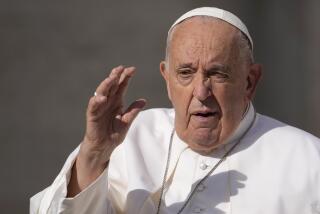A papal stumble
- Share via
CONTRARY TO POPULAR BELIEF, the Roman Catholic Church does not hold that the pope is infallible in everything he says. Pope Benedict XVI underscored that doctrinal fine point Sunday when he said he was “deeply sorry” about the controversy concerning his recent comments about Islam.
Attenuated as it was, the apology was in order because the pope’s error was significant. Speaking last week in Germany, he quoted a 14th century Byzantine emperor who said that the prophet Muhammad was responsible for “things only evil and inhuman, such as his command to spread by the sword the faith he preached.” On Sunday, Benedict insisted that such denunciations of Islam “do not in any way express my personal thought.”
Then why cite them? At a time when Osama bin Laden and other Islamic militants are portraying the United States and other Western nations as Crusaders, the pope should have known better.
Forced conversions are not unique to Islam. Nobody on “Monty Python’s Flying Circus” may have expected the Spanish Inquisition, but anyone familiar with the history of Christianity knew that the pope’s comments would inspire tit-for-tat citations of that shameful institution and other examples of the traditional Christian view, repudiated by the Second Vatican Council, that “error has no rights.”
Not just Roman Catholics but other Christians through the centuries have imposed the faith by the sword or through legal penalties. Catholics were persecuted by Protestant monarchs in England and remained second-class citizens until the 19th century. To this day England has an established church, though Christianity obviously doesn’t govern public policy in that country the way Islam does in some Middle Eastern countries.
Intolerance is and always has been an occupational hazard for the preacher of any perceived divine revelation. That said, Christianity in many of its manifestations has moved beyond intimidation. In 1965, Vatican II declared that “the human person has a right to religious freedom” and must be “immune from coercion” in matters of faith.
Even some Muslims acknowledge that Islam often has not made the same accommodation to freedom of conscience. The pope may object to the portrait of Catholicism in “The Da Vinci Code,” but he has not threatened the life of author Dan Brown. When Salman Rushdie’s “The Satanic Verses” was published, the Ayatollah Ruhollah Khomeini issued a fatwa calling on devout Muslims to kill the Anglo-Indian author. The armchair academic explanation for this disparity is that, however reluctantly, much of Christianity has made peace with the Enlightenment, while much of Islam has not.
That seems to have been the larger point that Benedict was trying to make in Germany, where he began his career as a university professor. The problem is that he isn’t a professor now; he’s the pope. And although they may be infallible when it comes to faith and morals, popes need to watch their words when they have political consequences.
More to Read
Sign up for Essential California
The most important California stories and recommendations in your inbox every morning.
You may occasionally receive promotional content from the Los Angeles Times.













